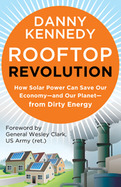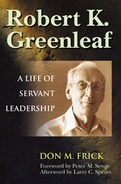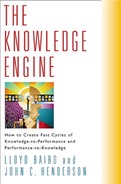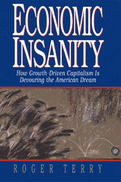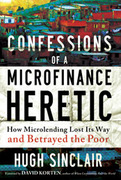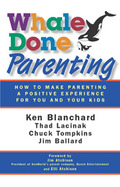2012
- Written by one of the world's leading solar entrepreneurs
- Powerfully lays out the case for solar power, which author Danny Kennedy calls "the biggest untold economic story of our time"
- Filled with eye-opening insights and inspiration
- Click here to read the press release
Solar power's detractors have been proclaiming that the collapse of solar panel manufacturer Solyndra proves solar is just a hippie pipe dream. But as Danny Kennedy points out, Solyndra's downfall actually proves the opposite: the company failed because it wasn't able to compete in a red-hot industry, not because solar isn't ready for prime time. In this succinct, hard-hitting book, Kennedy proves that solar can save money, create jobs, and protect the environmentand only politics and perception stand in its way.
Signs of solar's ascendency are everywhere. The industry employs 100,000 people in the United States, twice as many as in 2009 and twice the number of coal miners. In 2011, Warren Buffett invested $2 billion in a solar farm, and General Electric bought a start-up solar manufacturer, announcing, "By 2020 this is going to be at least a $1 billion product line." Production of solar-generated electricity rose by 45 percent in the first three quarters of 2010, while electricity from natural gas rose only 1.6 percent and coal declined by 4.2 percent.
But powerful forces are still arrayed against solar power, and that's why Kennedy wrote this book. We need a rooftop revolution to break the entrenched power of the coal, oil, nuclear, and natural gas industries (which Kennedy calls King CONG) and their bought-and-paid-for allies. Kennedy systematically refutes the lies spread by CONGthat solar is expensive, inefficient, and unreliable; and many other untruths -- and shows that the solar industry can become a far greater source of jobs than it already is. Praising the pioneers who are pushing solar forward, Kennedy also decries the rampant political pandering that keeps us dependent on dirty and dangerous forms of energy. Now is the time to move away from the declining sources of the past and unleash the unlimited potential of the sun.
2004
- The first biography of Robert Greenleaf, originator of the immensely influential concept of "servant leadership" which plays a crucial role in the writings of today's most important business thinkers and has had an major impact on organizations of all types
- Explores the origin, development, basic concepts, and practical applications of the idea of servant leadership
- Greenleaf maintained friendships with some of the most important men and women of the twentieth century, including Eleanor Roosevelt, Peter Drucker, the Menninger brothers, Reinhold Niebuhr, Aldous Huxley, Alcoholics Anonymous founder Bill Wilson, and many others
- Includes a foreword by Peter M. Senge
2001
The new economy moves with lightning speed. Those who would lead no longer have the luxury of analyzing, planning, then implementing. They must plan and implement simultaneously. Learning and performance must be integrated into a continuous cycle: knowledge must be captured from performance as it is happening and used to improve the next round of performance.
In their new book, Lloyd Baird and John Henderson show how to produce knowledge as part of the work process and quickly apply that learning back to performance to create a "knowledge engine" that drives ongoing performance improvement and adds value in every area of the organization. Built on five years of research and application in leading corporations, The Knowledge Engine details a five-step knowledge-performance cycle, explaining how to:
- Focus on exactly what is necessary to drive performance and create competitive advantage
- Acquire knowledge you can use as you go, performing and learning simultaneously
- Structure learning so that it can be shared and benefit the entire organization
- Target knowledge so that the organization applies it when and where it is really needed
- Reflect on the big picture the new knowledge presents, consolidate it, and identify new areas of focus
The book includes a wealth of practical tools that organizations can use to put each step of the knowledge-performance cycle into actual practice-such as an "After Action Review, " that helps explore lessons learned from performance and a "Peer Review, " that gets what others know into the performance process quickly.
The Knowledge Engine not only explains the principles of creating and leveraging knowledge as an asset that will provide competitive advantage-it gives concrete examples of how to do it right now. The authors provide extensive illustrations of how leading organizations-including BP Amoco, Xerox, the U.S. Army, Merck, and Lucent-are getting improved performance and bottom line results by creating their own "knowledge engines, " and offer a framework to help any organization implement systems and procedures for leveraging its knowledge assets.
- Provides hands-on tools to drive knowledge into action and produce performance results
- Offers a new way for integrating learning and knowledge creation into the performance process, making it part of everyone's job
- Includes extensive examples of how leading organizations are creating and leveraging knowledge to improve performance and add to the bottom line
1995
"Economic insanity" describes what is happening in America and the wider world beyond its borders. The economy is out of control-out of our control-to the point that it is in control. The economy has divorced itself from the political and social ideals that define the American Dream, which has been transformed from an all-inclusive social ideal to an economic fantasy.
In Economic Insanity, Roger Terry explains how and why economics has come to dominate all aspects of our lives. Basic political, social, and moral values used to hold us together as a nation. Today, it seems, the economy is all that holds us together. The most drastic effects of the rise of Economic America are the impoverishing of democracy, the loss of liberty, and the abandonment of equality. Terry shows how our present system is failing at its most fundamental task-to provide for the physical needs and wants of human beings-and concludes that the system does not need fixing, it needs to be replaced.
This provocative proposal exposes the misconceptions that drive our economic system and offers systemic and revolutionary solutions. With passion and persuasiveness, Terry asserts that in order to recapture the American Dream, we must begin to subject the economy to the ideals of democracy, liberty, equality, and unity.
Terry questions, and suggests we abandon, four fundamental pillars of capitalism: endless economic growth, ever-increasing productivity, accelerating technological advances, and self-interest. He shows how these basic assumptions that drive our version of the free-market system are causing a host of interrelated and deeply entrenched problems. He explores critical social dilemmas that result from our current economic assumptions, including the loss of personal freedom and democracy, the perpetual and unavoidable increase in inequality, and the disuniting of America. If we are to turn our nation from this path of folly, Terry argues, we must first abandon the faulty assumptions that drive our thinking.
Terry proposes a solution that redefines the notion of capital ownership, creating a system of limited, widespread ownership in which individuals own only as much capital as they can make personal productive use of. Under this system, employees become owner/partners, power is returned to people, self-interest is defused, technology is harnessed, and meaningful equality is encouraged.
Incorporating ideas from Adam Smith and Thomas Paine to Paul Johnson and Herman Daly, Economic Insanity challenges readers to stop looking for answers within the system and look instead to changing the system.
- Shows America's economic system to be at odds with its social and political goals and proposes a system designed to increase personal freedom
- Questions the most basic assumptions that drive our economic system, and argues that its entire structure must be challenged
A deeply personal story written by a microfinance insider whose decade in the industry turned him into a heretic. It reveals the shocking truth of the industry once hailed as the miraculous solution to world poverty, and profiles the few shining exceptions to industry-wide corruption.
Very little solid evidence exists that microloans make a dent in long-term poverty. Sadly, evidence does exist for negligence, corruption, and methods that border on extortion. Part exposé, part memoir, and part financial detective story, this is the account of a one-time true believer whose decade in the industry turned him into a heretic. Hugh Sinclair worked with several microfinance institutions around the world. He couldn’t help but notice that even with a booming $70 billion industry on their side, the poor didn’t seem any better off. Exorbitant interest rates led borrowers into never-ending debt spirals, and aggressive collection practices resulted in cases of forced prostitution, child labor, suicide, and nationwide revolts against the microfinance community. Sinclair weaves a shocking tale of a system increasingly focused on maximizing profits—particularly once large banks got involved. He details his discovery of several scandals, one of the most disturbing involving a large African microfinance institution of questionable legality that charged interest rates in excess of 100 percent per year and whose investors and supporters included some of the most celebrated leaders of the microfinance sector. Sinclair’s objections were first met with silence, then threats, attempted bribery, and a court case, and eventually led him to become a principal whistleblower in a sector that had lost its soul. Microfinance can work—Sinclair describes moving experiences with several ethical and effective organizations and explains what made them different. But without the fundamental reforms that Sinclair recommends here, microfinance will remain an “investment opportunity” that will leave the poor with hollow promises and empty pockets.- A deeply personal story written by a microfinance insider who was once tapped as an anonymous source for a New York Times expos
- Reveals the shocking truth of the industry once hailed as the miraculous solution to world poverty
- Profiles the few shining exceptions to industry-wide corruption and offers solutions to clean up the rest
- Please click here for press release
Offering inspiring success stories, the microfinance industry depends on the faith of investors that small loans can transform the lives of the poor. But as Hugh Sinclair points out, very little solid evidence exists that microloans make a dent in long-term poverty. Evidence does exist for negligence, corruption, and methods that border on extortion. Part expos, part memoir, and part financial detective story, this is the account of a one-time true believer whose decade in the industry turned him into a heretic.
Sinclair worked with several microfinance institutions and funds as he traveled from Mexico to Mongolia, with Nigeria, Holland, and Mozambique in between. He couldnt help but notice that even with a booming $70 billion industry on their side, the poor didnt seem any better off in practice. Exorbitant interest rates led borrowers into never-ending debt spirals, and aggressive collection practices resulted in cases of forced prostitution, child labor, suicide, and nationwide revolts against the microfinance community.
With characteristic intelligence and biting wit, Sinclair weaves a shocking tale of a system increasingly focused on maximizing profits. The situation worsened when large banks, attracted by the high repayment rates of overpriced loans, hijacked the sector and created a microfinance bubble. Sinclair details his discovery of several scandals, one of the most disturbing involving a large African Microfinance institution of questionable legality which charged interest rates in excess of 100% per year, and whose investors and supporters included some of the most celebrated leaders of the microfinance sector. Sinclairs objections were first met with silence, then threats and attempted bribery, a court case, and eventually led him to become a principle whistleblower in a sector that had lost its soul.
Microfinance can workSinclair describes moving experiences with several ethical and effective organizations and analyzes what made them different. But without the fundamental reforms that Sinclair recommends here, microfinance will remain an investment opportunity that will leave the poor with hollow promises and empty pockets.
2009


